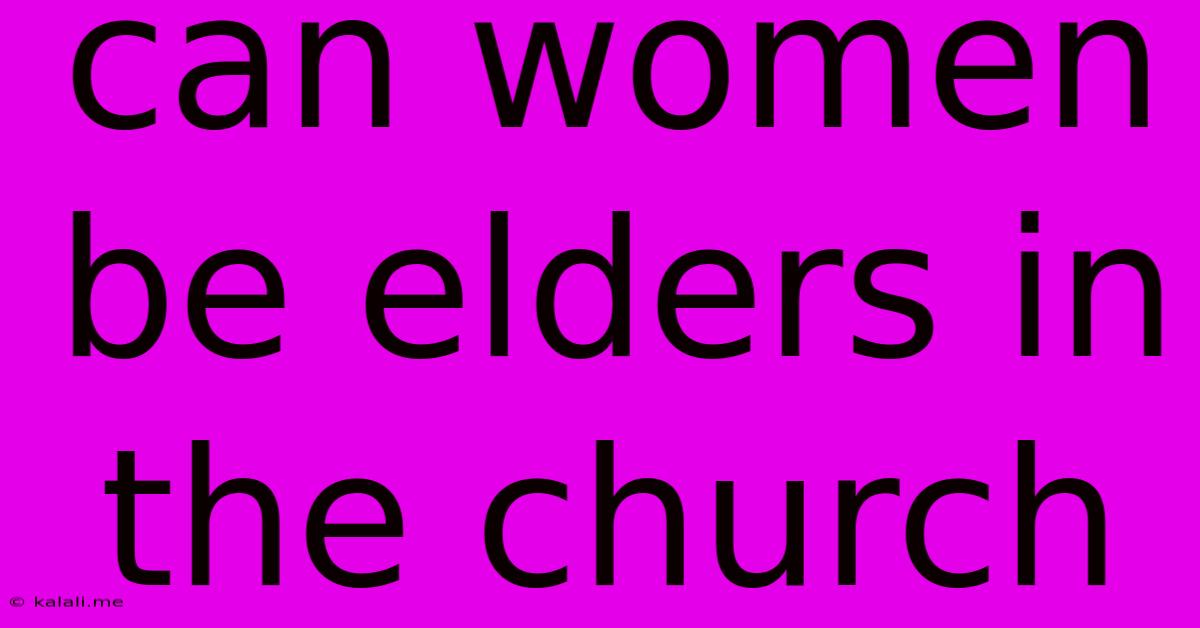Can Women Be Elders In The Church
Kalali
Jun 03, 2025 · 3 min read

Table of Contents
Can Women Be Elders in the Church? A Biblical and Theological Examination
Meta Description: The question of women elders in the church sparks passionate debate. This article explores biblical interpretations, theological perspectives, and historical context to offer a balanced understanding of this complex issue.
The question of whether women can be elders in the church is a deeply divisive one within Christianity. Different denominations and individual churches hold varying views, often stemming from diverse interpretations of scripture and theological traditions. This article aims to provide a balanced overview of the arguments surrounding this complex issue, exploring both sides of the debate while acknowledging the historical and cultural influences that have shaped current perspectives.
Biblical Interpretations: Differing Perspectives
The primary source of contention lies in the interpretation of specific biblical passages, particularly those in 1 Timothy 2:11-15 and 1 Corinthians 14:34-35. Conservative interpretations often cite these verses as prohibiting women from holding authoritative roles within the church, arguing that Paul's instructions reflect a divinely ordained order. These interpretations emphasize the hierarchical structure presented, with men positioned as heads of households and churches.
However, progressive interpretations offer alternative readings. They argue that the cultural context of the first century must be considered, suggesting that Paul's instructions were specific to the social norms of his time, rather than a timeless, universal directive. Furthermore, they point to examples of women leaders in the early church, like Priscilla and Junia (Romans 16:7), whose roles are debated but suggest a level of authority and influence exceeding those of mere church members. These perspectives highlight the importance of understanding the historical and cultural nuances of the biblical text, asserting that a direct application to modern church structures might be inappropriate.
Theological Considerations: Authority and Leadership
Beyond specific scriptures, the broader theological concepts of authority and leadership play a crucial role in the debate. Those who oppose women elders often emphasize a hierarchical understanding of church structure, mirroring patriarchal societal norms. They often cite the concept of male headship as a divinely ordained principle. Conversely, those who support women elders emphasize egalitarian principles, arguing that all believers are equal in Christ and that leadership roles should be based on spiritual gifts and qualifications, not gender. This perspective often points to the holistic nature of God's creation, seeing no inherent reason to restrict leadership based on gender.
Furthermore, the understanding of the nature of spiritual authority itself is central. Some argue that spiritual authority is inherently linked to a specific gender role, while others see spiritual authority as derived from the Holy Spirit’s gifting, independent of gender. These different views on authority shape the interpretations of biblical texts and the overall understanding of appropriate church governance.
Historical Context and Cultural Influences
The debate surrounding women elders is not solely a matter of biblical interpretation; it’s also profoundly shaped by historical and cultural contexts. For centuries, patriarchal structures dominated societal and religious life, influencing interpretations of scripture and practices within the church. The rise of feminist theology and the increasing awareness of gender inequality have challenged traditional interpretations, leading to significant shifts in perspectives within many denominations. Understanding the historical evolution of these perspectives is crucial to appreciating the nuances of the current debate.
Conclusion: An Ongoing Dialogue
The question of whether women can be elders in the church remains a complex and contested issue within Christianity. There is no single, universally accepted answer. Understanding the varied perspectives requires careful consideration of biblical interpretations, theological principles, and the historical context of the debate. Ultimately, the discussion calls for respectful dialogue and a willingness to engage with diverse viewpoints, aiming for a deeper understanding of scripture and its implications for church life today. The continued exploration of this issue is vital for fostering inclusive and thriving Christian communities.
Latest Posts
Latest Posts
-
James Hardie Soffit And Fascia Repair Nail Holes
Jun 05, 2025
-
Why Do Male Dogs Kill Puppies
Jun 05, 2025
-
Reimport The Files In Python After Editing
Jun 05, 2025
-
How To Know What Drill Size To Use
Jun 05, 2025
-
Theres As Many Locks And Keys As You Allow
Jun 05, 2025
Related Post
Thank you for visiting our website which covers about Can Women Be Elders In The Church . We hope the information provided has been useful to you. Feel free to contact us if you have any questions or need further assistance. See you next time and don't miss to bookmark.